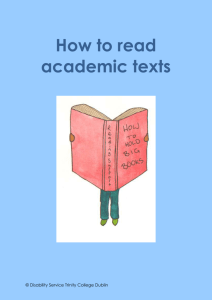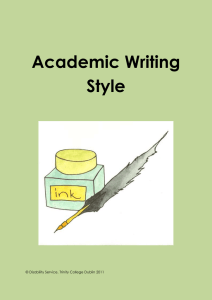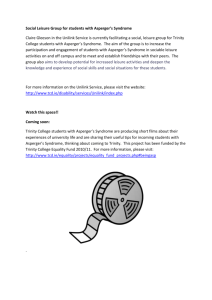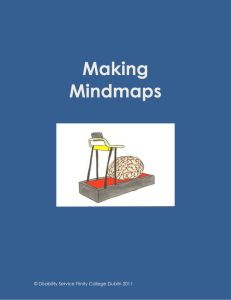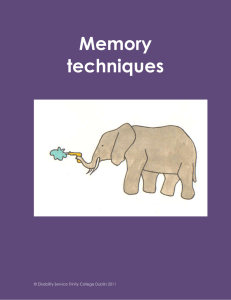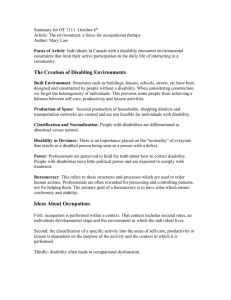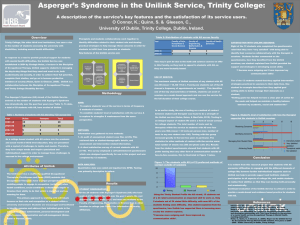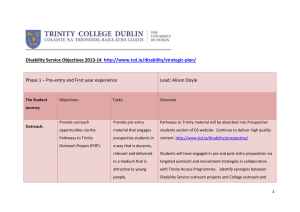An Occupation Based Service for Third Level Students with Significant Mental Health Issues.
advertisement
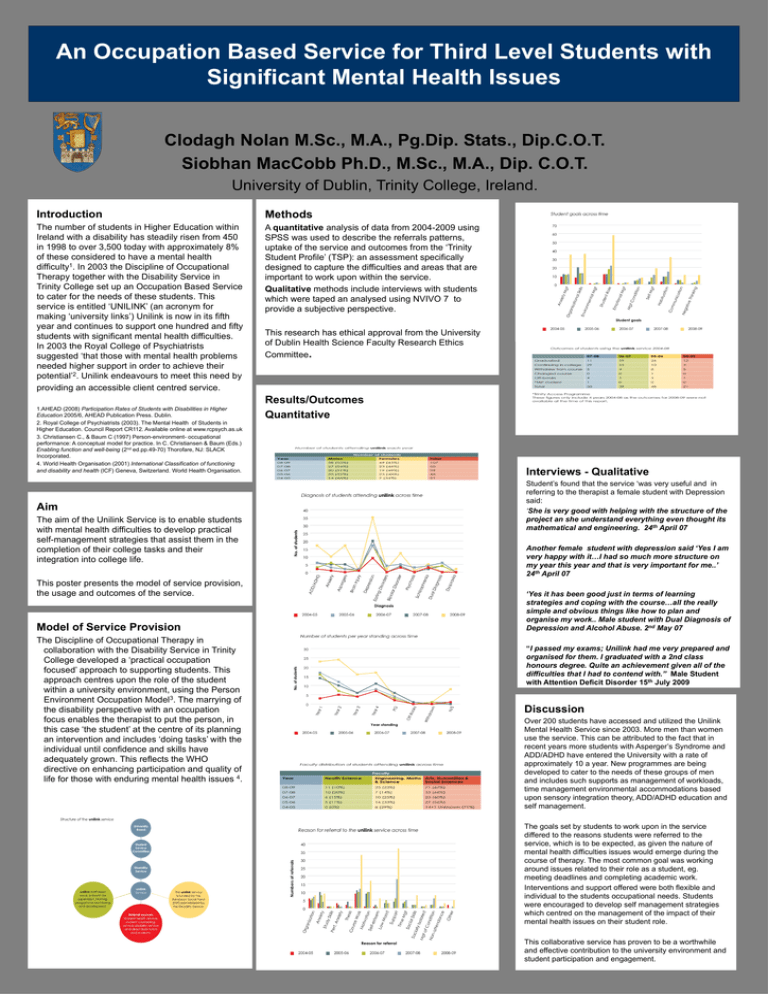
An Occupation Based Service for Third Level Students with Significant Mental Health Issues Clodagh Nolan M.Sc., M.A., Pg.Dip. Stats., Dip.C.O.T. Siobhan MacCobb Ph.D., M.Sc., M.A., Dip. C.O.T. University of Dublin, Trinity College, Ireland. Introduction Methods The number of students in Higher Education within Ireland with a disability has steadily risen from 450 in 1998 to over 3,500 today with approximately 8% of these considered to have a mental health difficulty1. In 2003 the Discipline of Occupational Therapy together with the Disability Service in Trinity College set up an Occupation Based Service to cater for the needs of these students. This service is entitled ‘UNILINK’ (an acronym for making ‘university links’) Unilink is now in its fifth year and continues to support one hundred and fifty students with significant mental health difficulties. In 2003 the Royal College of Psychiatrists suggested ‘that those with mental health problems needed higher support in order to achieve their potential’2. Unilink endeavours to meet this need by providing an accessible client centred service. A quantitative analysis of data from 2004-2009 using SPSS was used to describe the referrals patterns, uptake of the service and outcomes from the ‘Trinity Student Profile’ (TSP): an assessment specifically designed to capture the difficulties and areas that are important to work upon within the service. Qualitative methods include interviews with students which were taped an analysed using NVIVO 7 to provide a subjective perspective. 1.AHEAD (2008) Participation Rates of Students with Disabilities in Higher Education 2005/6, AHEAD Publication Press. Dublin. 2. Royal College of Psychiatrists (2003). The Mental Health of Students in Higher Education. Council Report CR112. Available online at www.rcpsych.as.uk 3. Christiansen C., & Baum C (1997) Person-environment- occupational performance: A conceptual model for practice. In C. Christiansen & Baum (Eds.) Enabling function and well-being (2nd ed.pp.49-70) Thorofare, NJ: SLACK Incorporated. 4. World Health Organisation (2001) International Classification of functioning and disability and health (ICF) Geneva, Switzerland. World Health Organisation. Aim The aim of the Unilink Service is to enable students with mental health difficulties to develop practical self-management strategies that assist them in the completion of their college tasks and their integration into college life. This poster presents the model of service provision, the usage and outcomes of the service. Model of Service Provision The Discipline of Occupational Therapy in collaboration with the Disability Service in Trinity College developed a ‘practical occupation focused’ approach to supporting students. This approach centres upon the role of the student within a university environment, using the Person Environment Occupation Model3. The marrying of the disability perspective with an occupation focus enables the therapist to put the person, in this case ‘the student’ at the centre of its planning an intervention and includes ‘doing tasks’ with the individual until confidence and skills have adequately grown. This reflects the WHO directive on enhancing participation and quality of life for those with enduring mental health issues 4. This research has ethical approval from the University of Dublin Health Science Faculty Research Ethics Committee. Results/Outcomes Quantitative Interviews - Qualitative Student’s found that the service ‘was very useful and in referring to the therapist a female student with Depression said: ‘She is very good with helping with the structure of the project an she understand everything even thought its mathematical and engineering. 24th April 07 Another female student with depression said ‘Yes I am very happy with it…I had so much more structure on my year this year and that is very important for me..’ 24th April 07 ‘Yes it has been good just in terms of learning strategies and coping with the course…all the really simple and obvious things like how to plan and organise my work.. Male student with Dual Diagnosis of Depression and Alcohol Abuse. 2nd May 07 “I passed my exams; Unilink had me very prepared and organised for them. I graduated with a 2nd class honours degree. Quite an achievement given all of the difficulties that I had to contend with.” Male Student with Attention Deficit Disorder 15th July 2009 Discussion Over 200 students have accessed and utilized the Unilink Mental Health Service since 2003. More men than women use the service. This can be attributed to the fact that in recent years more students with Asperger’s Syndrome and ADD/ADHD have entered the University with a rate of approximately 10 a year. New programmes are being developed to cater to the needs of these groups of men and includes such supports as management of workloads, time management environmental accommodations based upon sensory integration theory, ADD/ADHD education and self management. The goals set by students to work upon in the service differed to the reasons students were referred to the service, which is to be expected, as given the nature of mental health difficulties issues would emerge during the course of therapy. The most common goal was working around issues related to their role as a student, eg. meeting deadlines and completing academic work. Interventions and support offered were both flexible and individual to the students occupational needs. Students were encouraged to develop self management strategies which centred on the management of the impact of their mental health issues on their student role. This collaborative service has proven to be a worthwhile and effective contribution to the university environment and student participation and engagement.

